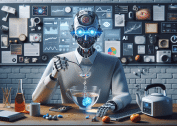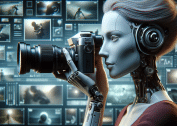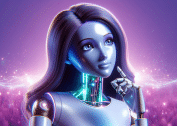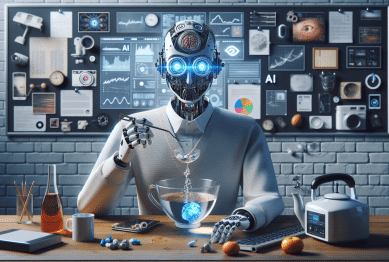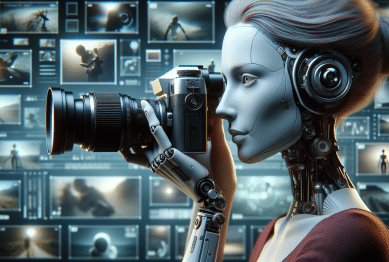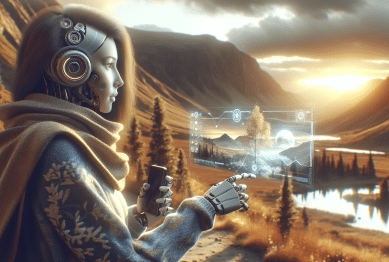Artificial intelligence tools are transforming how people work, solve problems, and connect with technology. Artificial intelligence in daily life is already improving productivity, automating tasks, and driving discoveries. At the same time, it raises questions about privacy, creativity, and the skills needed for the future workforce.
The AI Revolution in Everyday Technology
Artificial intelligence (AI) has become a central part of modern technology. It is quietly integrated into devices and apps that millions use daily. For example, voice assistants manage reminders and smart home systems adjust temperatures automatically.
Moreover, AI tools analyze data streams to make routine processes smarter and more personalized. Whether suggesting a film, assisting with directions, or filtering emails, AI makes technology more responsive than ever before. This blend of automation and prediction creates seamless experiences for users of all ages.
Beyond smartphones, AI is also transforming healthcare and education. Doctors now use AI to interpret scans and patient history with greater speed and accuracy. Meanwhile, teachers employ adaptive platforms that adjust lessons based on student progress. As a result, artificial intelligence in daily life improves efficiency and frees more time for human interaction.
Finally, as models absorb more data, predictions will become increasingly accurate. However, society must also address ethical questions to ensure AI is used responsibly. Consequently, the AI revolution is not just accelerating—it is already embedded in daily routines.
AI and Productivity: Changing the Workplace
AI-driven automation is reshaping the work landscape. Chatbots handle customer questions around the clock. Automated scheduling tools coordinate meetings without human input. As a result, workers save time for strategy, creativity, and innovation.
In finance, AI identifies risks in real time. In logistics, it optimizes delivery routes and inventory management. These gains prove that artificial intelligence in daily life helps industries operate with more precision and speed.
In addition, collaboration platforms with AI support real-time translation and transcription. This makes teamwork more inclusive for global groups. Beyond communication, AI also summarizes documents and assists with brainstorming. Consequently, companies can focus attention on innovation, while AI handles repetitive tasks.
Still, AI adoption also sparks debates about job displacement. Employees now need to learn how to work with these platforms to stay competitive. Therefore, businesses and workers alike are investing in AI literacy and upskilling programs. Those who adapt quickly gain new opportunities as machine intelligence complements human ingenuity.
Unlocking Scientific Discovery with AI Models
AI is accelerating advances in science by analyzing complex datasets faster than humans. For example, drug discovery that once took years can now be shortened by AI models that predict promising compounds. Similarly, in climate science, AI parses satellite imagery to detect environmental changes.
Moreover, genomics and chemistry benefit from high-throughput computing. Researchers can now simulate thousands of experiments within days. This efficiency saves costs and allows them to focus on the most promising results.
In addition, cloud-based AI tools are making advanced analytics more widely available. Startups, labs, and even students now have access to resources once reserved for large institutions. However, transparency and reproducibility remain vital to maintain trust in AI-powered science.
AI, Privacy, and Ethical Considerations
As AI systems handle sensitive personal data, privacy concerns are increasing. Facial recognition, voice processing, and health record analysis all depend on data security. Without safeguards, information could be exposed or misused. Therefore, governments and tech leaders are debating regulations that balance innovation with individual rights.
Furthermore, bias in AI decision-making is another serious issue. Models trained on unbalanced datasets may perpetuate discrimination. As a result, accountability and explainability are essential in AI development. Independent audits and ethical frameworks are now being introduced to address these risks.
In addition, AI ethics is becoming part of education and workplace training. Institutions encourage responsible practices, emphasizing fairness, security, and privacy from the start. Consequently, organizations that prioritize ethics will build more trust and deliver AI systems that truly serve everyone.
AI and Creativity: Expanding Human Potential
AI is not limited to data analysis. It is also entering creative industries, supporting artists, writers, and musicians. For example, designers use AI to generate unique styles, while composers experiment with algorithms that suggest new melodies. Writers employ AI tools to brainstorm or overcome creative blocks.
Rather than replacing human creativity, AI acts as a partner. With vast digital archives to draw from, it provides inspiration quickly. In addition, creators can test more ideas in less time, exploring directions they might not have considered.
The partnership is especially visible in personalized content. Playlists, book recommendations, and custom shopping designs now adapt to personal tastes. However, these shifts also raise questions about originality and ownership. Despite this, the synergy between AI and human imagination continues to expand creative possibilities.
Preparing for Tomorrow: Upskilling in an AI World
Adapting to artificial intelligence in daily life requires building new digital skills. Education platforms now provide AI courses for all levels, from beginners to advanced learners. Topics include programming, data analysis, and machine learning. As a result, people can earn credentials that boost workplace competitiveness.
Moreover, empathy, adaptability, and judgment remain uniquely human skills. Analysts believe combining these qualities with technical expertise will be key to thriving in AI-driven workplaces. Community groups also organize mentorships and training sessions, ensuring benefits are shared widely.
Finally, lifelong learning is becoming essential. Workshops, open courses, and open-source projects help individuals stay up to date. By actively engaging in continuous education, people can shape their careers and contribute to an inclusive AI-powered future.
References
1. National Institute of Standards and Technology. (2022). Artificial Intelligence: Public Working Group. Retrieved from https://www.nist.gov/artificial-intelligence/public-working-group
2. European Commission. (2020). White Paper on Artificial Intelligence. Retrieved from https://ec.europa.eu/info/sites/default/files/commission-white-paper-artificial-intelligence-feb2020_en.pdf
3. World Economic Forum. (2023). Global AI Adoption Index. Retrieved from https://www.weforum.org/agenda/2023/01/artificial-intelligence-ai-adoption-worldwide/
4. Stanford Institute for Human-Centered Artificial Intelligence. (2023). AI Index Report. Retrieved from https://hai.stanford.edu/research/ai-index-2023
5. Brookings Institution. (2022). Artificial Intelligence and Emerging Technology Initiative. Retrieved from https://www.brookings.edu/project/artificial-intelligence-and-emerging-technology-initiative/
6. MIT Open Learning. (2023). Learn Artificial Intelligence with MIT. Retrieved from https://openlearning.mit.edu/courses-programs/ai


